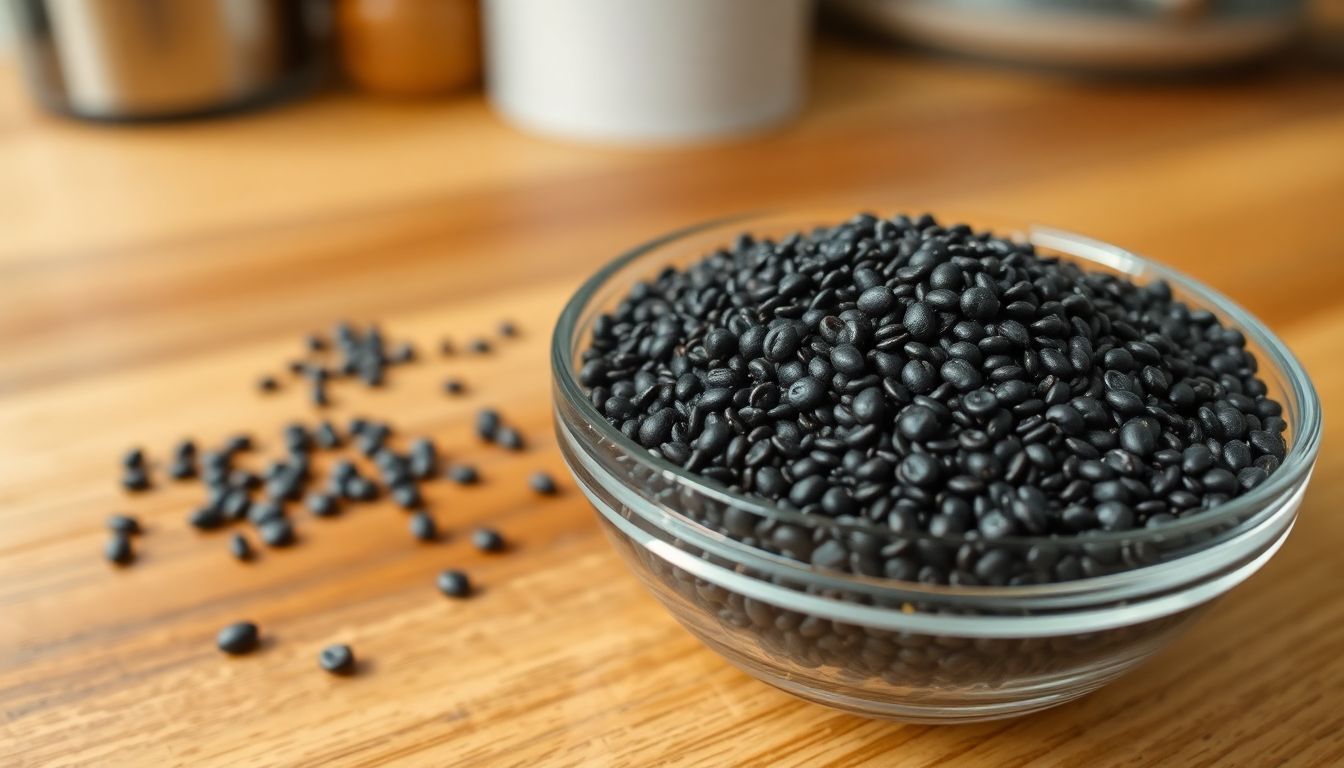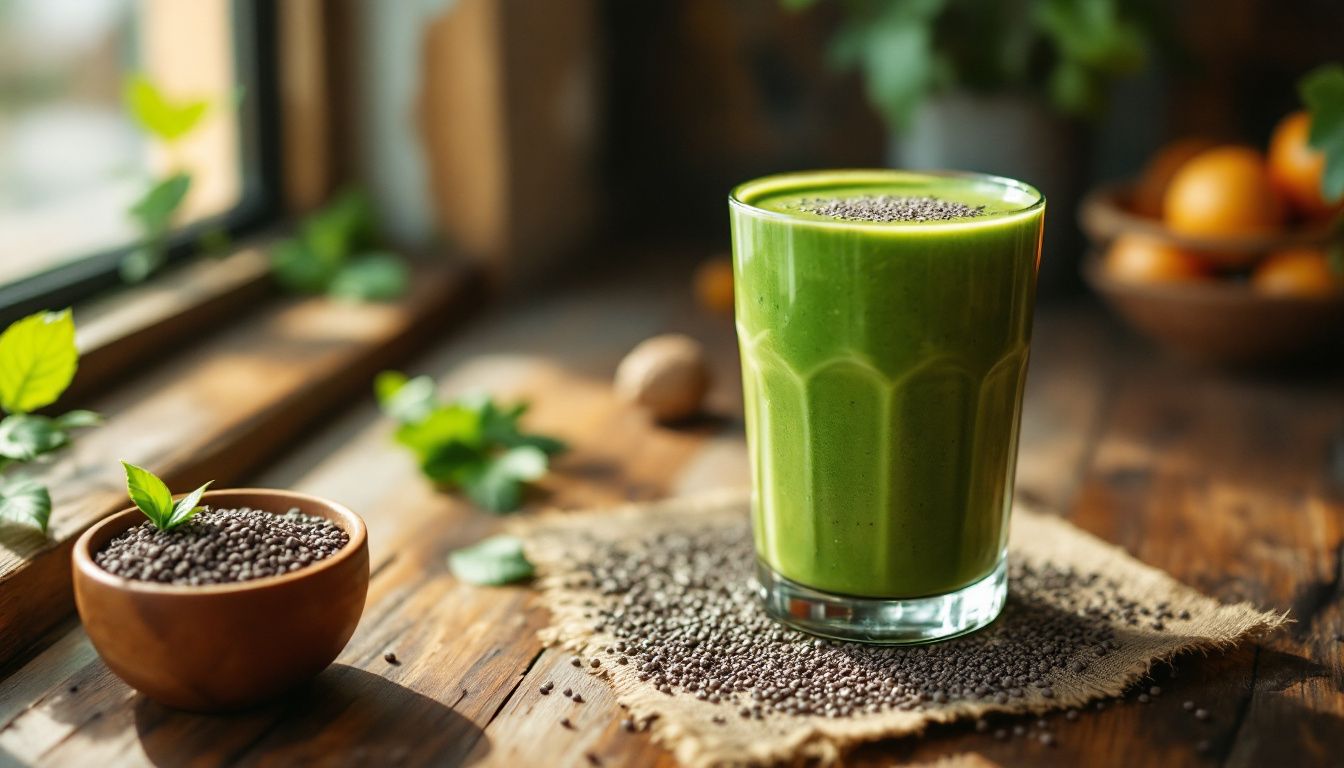Struggling to make healthy choices in your diet? Chia seeds, tiny yet powerful, pack a big nutritional punch. This blog will explain their benefits, from heart health to blood sugar control.
Thank you for reading this post, don't forget to subscribe!Keep reading—you’ll learn how these little seeds can boost your well-being!
Key Takeaways
- Chia seeds are rich in omega-3 fatty acids, like alpha-linolenic acid (ALA), which support heart health by lowering LDL cholesterol and reducing inflammation.
- They provide 11 grams of fiber in just two tablespoons, aiding digestion, controlling blood sugar levels, and promoting satiety for weight management.
- Packed with antioxidants like quercetin, these seeds fight oxidative stress and reduce chronic disease risks while supporting bone health.
- Chia seeds offer complete protein with all nine essential amino acids; two tablespoons contain 4 grams of high-quality plant-based protein.
- Easy to use, chia seeds can be added to pudding, smoothies, yogurt, or baking recipes for a quick nutritional boost.
What are Chia Seeds?
Chia seeds come from the plant *Salvia hispanica L.*, which is native to Mexico and Guatemala. These tiny black or white seeds were a staple food for the Aztecs as early as 3500 BC and even used in their religious ceremonies.
Today, they are considered one of the healthiest foods on Earth.
Packed with omega-3 fatty acids like alpha-linolenic acid (ALA), chia seeds offer incredible nutritional value. They stand out as a rich source of dietary fiber, antioxidants, protein, and various essential nutrients.
Despite their small size, these “superfoods” are powerful additions to any healthy diet or lifestyle!
Nutritional Profile of Chia Seeds
Chia seeds pack a lot of nutrients in their tiny size. They are loaded with healthy fats, fiber, and plant-based protein—making them a great addition to many diets.
Omega-3 Fatty Acids
Omega-3 fatty acids make up about 60% of the oil in chia seeds. These healthy fats are crucial for heart health. They help lower LDL cholesterol, control blood pressure, and regulate heart rhythms.
By reducing inflammation, they also protect against chronic conditions like cardiovascular disease.
Alpha-linolenic acid (ALA), a type of omega-3 found in chia seeds, is essential for the body. It supports cognitive health and reduces risks linked to ischemic heart disease. Including foods rich in omega-3s can improve overall well-being… Next: High Fiber Content!
High Fiber Content
Chia seeds pack 11 grams of dietary fiber in just two tablespoons (28 grams). That’s about 30% of your daily fiber needs. This high fiber content can help lower LDL cholesterol and improve heart health.
Soluble fiber in chia slows digestion, keeping blood sugar levels steady and reducing spikes.
Fiber promotes satiety, making you feel full longer. This aids weight management and prevents overeating. Including fiber-rich foods like chia seeds in meals or snacks supports healthy eating habits and digestive health.
Rich in Antioxidants
These tiny seeds pack powerful antioxidants like quercetin and caffeic acid. These compounds fight oxidative stress, damaging cells and speeding up aging. They also help reduce inflammation, a key factor in many chronic diseases.
Antioxidants protect bone cells from harm caused by free radicals. This support may promote stronger bones over time. Adding chia seeds to your meals boosts your intake of these protective nutrients while supporting overall health.
Protein
While rich in antioxidants, chia seeds are a powerful protein source. Just two tablespoons (about 28 grams) offer 4 grams of protein. Unlike many plant-based options, chia seeds provide all nine essential amino acids—making them a complete protein.
This high-quality protein supports muscle growth and repair, especially after strength training or physical activity. Grinding the seeds may help your body absorb nutrients better when eaten dry.
Incorporating chia can boost nutrient intake naturally for those on plant-rich diets or exploring whole foods like botanical nuts and grains.

Health Benefits of Chia Seeds
Chia seeds offer many advantages for your overall health. These tiny seeds support key aspects of the body, helping it work better every day.
Supports Cardiovascular Health
Omega-3 fatty acids in chia seeds, like alpha-linolenic acid (ALA), lower LDL cholesterol and support heart health. Studies show their impact is significant. For example, the Cardiovascular Health Study found a 50% lower risk of fatal ischemic heart disease in older adults with high ALA consumption.
High fiber content also plays a role. Soluble fiber helps reduce blood pressure while supporting better blood sugar control—both essential for reducing cardiovascular risk. Eating foods rich in dietary fiber, such as chia seeds, promotes overall cardiovascular health and lowers inflammation linked to heart disease.
Aids in Digestive Health
Chia seeds are rich in dietary fiber, especially soluble and insoluble types. This fiber absorbs water, forming a gel-like substance in the stomach. It slows digestion and helps prevent digestive issues like constipation.
Soluble fiber also supports gut health by feeding healthy bacteria in the intestines.
One ounce of chia seeds contains about 10 grams of fiber—almost 40% of daily needs for many adults. Consuming these tiny seeds may reduce LDL cholesterol levels while promoting smoother bowel movements.
To avoid discomfort or difficulty swallowing, drink enough water when eating them.
Helps Regulate Blood Sugar Levels
High fiber content in chia seeds slows sugar absorption. This helps lower high blood sugar levels and may reduce insulin resistance over time. For people with type 2 diabetes, eating foods like chia seeds can aid in better blood sugar control.
Regular consumption can also prevent big spikes or drops in glucose levels. Studies show that the soluble fiber forms a gel-like texture when mixed with liquids, which steadies carbohydrate breakdown.
This process supports overall metabolic health and combats issues tied to high blood pressure.
Promotes Bone Health
Chia seeds are rich in calcium, magnesium, and phosphorus. Just one ounce offers 18% of your daily calcium need. This supports stronger bones and teeth over time.
These tiny seeds also contain antioxidants. These fight oxidative stress and inflammation that can weaken bone cells. Regular intake may improve overall bone density for better long-term health.
How to Incorporate Chia Seeds Into Your Diet
Add chia seeds to meals for a simple health boost—sprinkle them on salads, mix into drinks, or use in baking.
Chia Pudding Recipe
Chia pudding is simple to make and full of nutrients. You can enjoy it as a healthy snack, breakfast, or dessert.
- Mix 1/3 cup of chia seeds with 1 cup of liquid. Use milk, almond milk, soy milk, or juice for the base.
- Stir the mixture well to avoid clumps. Let it sit for 15–20 minutes.
- Cover the bowl or jar and store in the refrigerator. The pudding lasts up to one week.
- For extra flavor, add nuts, fresh fruit, or a dash of cinnamon after soaking.
- Enjoy it cold as is or top with yogurt for an added boost of protein.
- Experiment by blending soaked chia pudding with fruits for a creamy smoothie dessert.
- Mix in honey or maple syrup before refrigerating if you prefer sweeter options.
Adding to Smoothies and Yogurts
Smoothies and yogurts are easy ways to enjoy chia seeds. They enhance flavor, texture, and boost nutrition in minutes.
- Mix 1-2 tablespoons of chia seeds into your smoothie before blending. They add omega-3 fatty acids, dietary fiber, and protein without altering the taste.
- Stir them directly into yogurt for a crunchy texture. Add honey or fruits like blueberries for extra sweetness and antioxidants.
- Let the seeds soak in your smoothie or yogurt for at least 10 minutes if you prefer a softer texture. They absorb liquid quickly, making them gel-like.
- Combine them with Greek yogurt to add protein and support weight management goals effectively.
- Pair them with whole grains like granola to make your snack more filling while supporting digestive health through soluble and insoluble fiber.
- Keep hydrated when eating chia seeds as they expand up to 12 times their weight in liquid to avoid digestive issues.
Baking with Chia Seeds
Chia seeds are great for baking. They add nutrition and improve the texture of baked goods.
- Replace eggs with chia seeds by mixing 1 tablespoon of whole or 2 teaspoons of ground chia seeds with 3 tablespoons of water. Let it sit for five minutes to form a gel.
- Add moisture to muffins, breads, or cakes by using chia seeds as a thickener. This keeps baked items soft and fresh longer.
- Use them in gluten-free recipes as a binding agent to hold ingredients together, much like eggs do in traditional recipes.
- Sprinkle whole chia seeds into dough or batter for an added crunch and fiber boost.
- Include ground chia seeds in brownies or cookies for extra omega-3 fatty acids without changing the flavor much.
- Bake energy bars with chia seeds for a healthy snack loaded with protein, insoluble fiber, and vitamins like B vitamins and vitamin E.
- Mix them into cornbread, pancakes, or scones for improved nutritional value while keeping the classic taste intact.
- Prepare savory crackers using chia seed gel as a base to replace oils or eggs while enhancing heart health benefits.
- Add chia gel to pizza dough to make it more elastic and nutrient-rich without altering its consistency too much.
- Make healthier Mediterranean-style bread by combining whole grains like brown rice flour with ground chia seeds for better cardiovascular health support.
Conclusion
Chia seeds pack a punch in nutrition and health perks. They support heart, digestive, and bone health while helping manage blood sugar levels. Easy to use, they fit into both sweet and savory dishes.
With their omega-3s, fiber, and protein, these tiny seeds contribute big benefits to a healthy lifestyle. Add them to your meals for simple yet impactful dietary changes!
